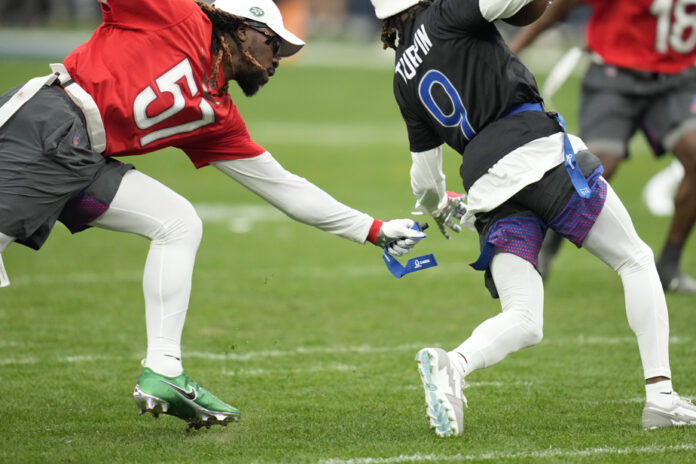Flag football will become an Olympic sport for the first time in 2028, and Jim Mullin can see the day coming when traditional football imitates it.
The International Olympic Committee (IOC) has included flag football in its official program, along with four new sports disciplines, ahead of the Los Angeles Summer Games.
The decision follows recommendations from the IOC Executive Board, the IOC Olympic Program Commission and the Los Angeles Games Organizing Committee, concluding a comprehensive two-year evaluation process.
“We are absolutely thrilled and delighted that after years of hard work, both at the International Federation of American Football (IFAF) and Football Canada levels, we are giving our young athletes a goal to achieve on the Olympic stage,” said Mullin, president of Football Canada.
“I am confident that you will see this wave not only fuel the Olympic teams, both men and women, but also improve our statistics in tackle football.
“That’s because all the skills you can master through flag football can be applied to tackling football. This gives parents the opportunity to choose whether their child should continue to play flag or tackle football as a teenager, or even play both. »
Unsurprisingly, the commissioner of the Canadian Football League, Randy Ambrosie, was happy with the announcement made Monday.
“I’m excited about the addition of flag football to the Olympics,” Ambrosie wrote on his X account.
“What a wonderful way to share the ultimate team sport with fans around the world. I can’t wait to see Team Canada compete against the world’s elite at the 2028 Los Angeles Games! »
At the Olympics, flag football will be played with five players from each team on the field.
Mullin, who is also general secretary of the IFAF, believes tackle football could follow in rugby’s footsteps and become an Olympic sport. Rugby is traditionally played as a 15-a-side game, but the sevens game became an Olympic event for men and women in 2016.
“I definitely see an opportunity, just like rugby sevens, for six-on-six tackle football,” Mullin said. “There are African countries that are driven by a passion for tackle football. So we need something that is smaller and more compact and allows athletes to compete at this level as well.
“One step at a time on this, because I think these are important steps for the global football community. »
Mullin is optimistic that the inclusion of flag football in the Olympics will increase participation at all levels of football in Canada. However, he said how countries will qualify flag football teams for the Olympics is still to be determined.
Sixty-five national teams are scheduled to compete in various IFAF continental competitions ahead of what the organization plans to be the world’s largest flag football championship in Lahti, Finland, in August 2024.
“I think there was a gap in the market for younger athletes,” Mullin said. And when I talk about younger athletes, I’m talking about young people under 12 to 14 years old who want to participate in a contactless activity.
“Football is an attractive sport for them and flagging is a great recreational sport that is economically accessible to all. If you take all of these factors and put them together, I think it should come as no surprise at the impact they have had on the registration of football players in Canada. »
Canada’s national teams are among the best in the world. The women’s team won the bronze medal at the Americas Continental Flag Football Championship which took place this summer in Charlotte, North Carolina. For its part, the men’s team lost 38-22 to Panama in their bronze medal match.















